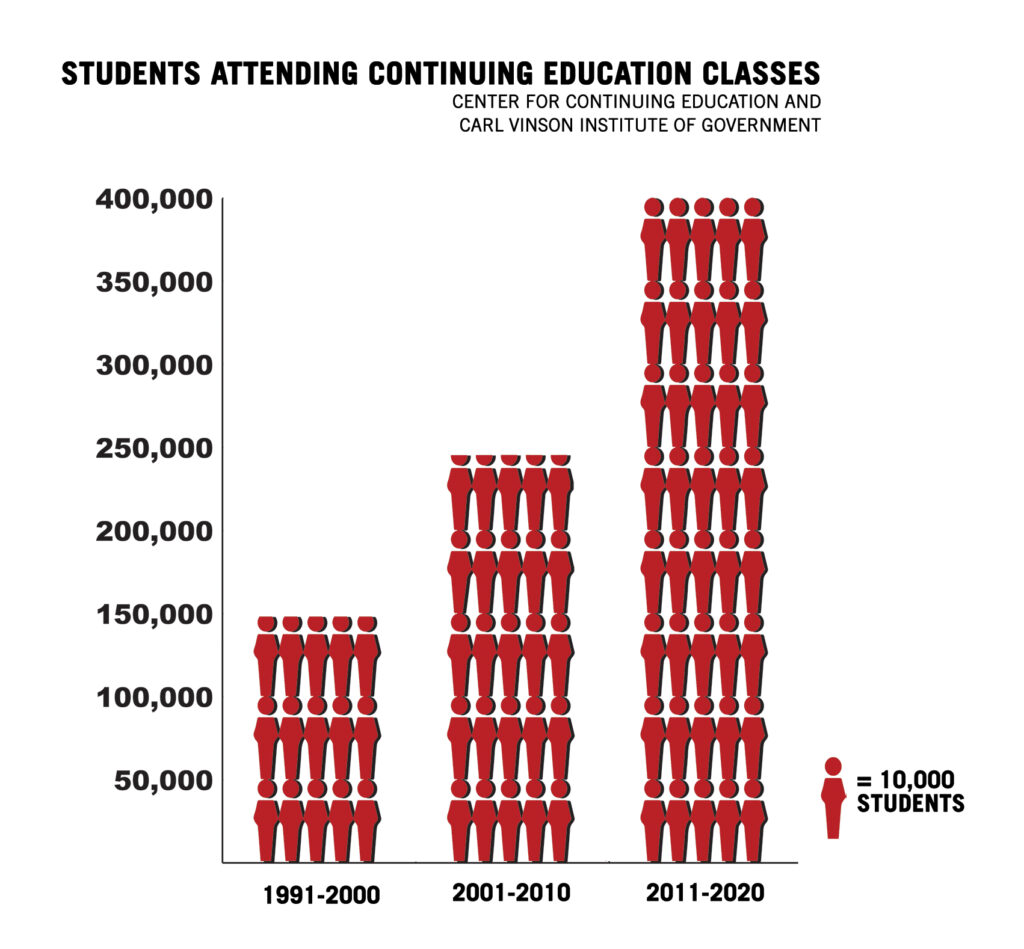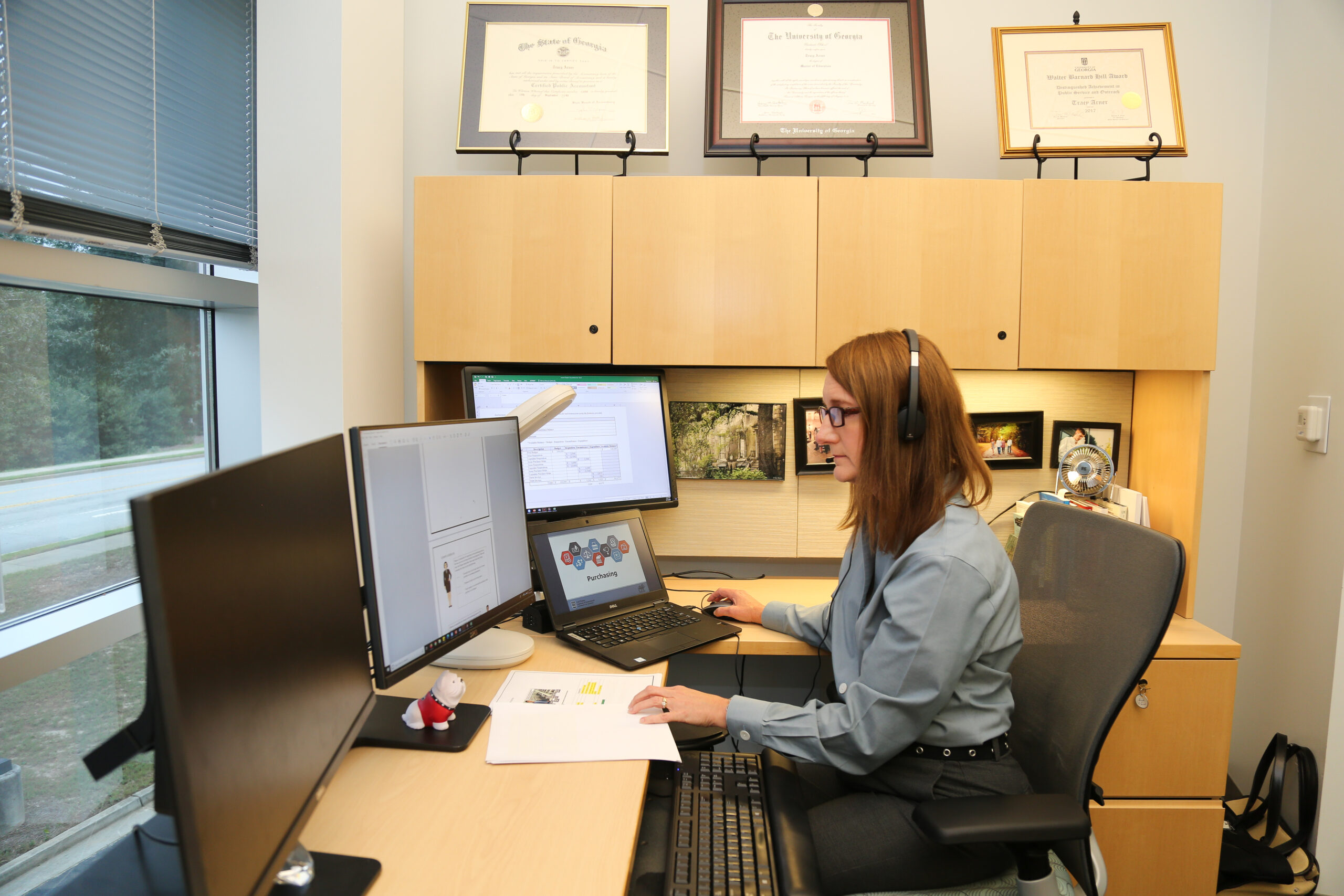In 2019, pulmonologist Dr. Tim Moriarty closed his clinical practice in Panama City Beach, Florida, after he lost hearing in his left ear. That’s when his daughter suggested he look into a career in medical consulting.
He did, and found the online Medical Professional Legal Consultant course offered through the University of Georgia Center for Continuing Education & Hotel.
“If you’re a lung doctor and you can’t hear through a stethoscope, you’re not much of a lung doctor. So, that forced some changes,” Moriarty said. “I went through all the universities that offered a course and UGA was the best fit.”
It was Moriarty’s first experience with online learning, but he didn’t stop there. His experience with the Georgia Center led him to pursue other continuing education opportunities that enhanced his expertise as a medical consultant.
Find something you enjoy
“Continuing education is so important. The day you stop learning is the day you die intellectually,” Moriarty said. “There’s a whole world of interesting things out there. Just go find something you enjoy, get online and find a course.”
Moriarty’s experience is part of a growing trend of continuing education outside of traditional undergraduate and master’s degree programs, which can be prohibitive to people with limited time and resources.
With rapid changes in technology, workforce needs evolve and employees that have been out of school for years find they need additional training and education to stay employed or move up. More portable credentials or badges—such as on-the job training, online or in-person instruction, or other learning outside the traditional education environment—are also increasingly important to individuals in the workforce as they seek advancement.
Both the Georgia Center and the Carl Vinson Institute of Government offer in-person and online continuing education programs to help individuals fill in the gaps, building on their existing skills or developing skills for a new occupation. These affordable courses, certificates and micro-credentials offer competency-based skills and knowledge that are critical to professional growth and development.
Specialized continuing education programs can lead to promotions and career advancement. The Institute of Government offers certifications that require participants to attend multiple sessions. Those, like the Certified Public Manager (CPM) program, help prepare current government employees for different roles and positions.
Of the 44 Fulton County employees who completed the CPM program in 2017, 61 percent were promoted within two years and received a salary increase. Notably, 98 percent of those employees are still employed by Fulton County.
“Thanks for another great experience for all of our [Fulton County] employees,” Fulton County Manager Dick Anderson told institute faculty member Walt McBride earlier this year. “One of the best investments in management development in my career.”
It was Fulton County that encouraged the Institute of Government to get the CPM started in 2017. Fulton’s human resources director, Kenneth Hermon, had led a similar program in the U.S. Virgin Islands and was anxious to have it available in Georgia. Almost 400 Fulton County employees have completed the program since it began.
Digital badges
The Georgia Center also awards digital badges for a number of programs. The digital badges are offered to many certificate programs as well as content specific programs that are akin to micro-credentialing, said Kiel Norris, director of continuing education at the Georgia Center.
An example is the Principles of Market Research Express courses that allow market research professionals to participate in specific short topic classes relevant to their industry. Upon completion they are awarded a digital credential that they can use to show proof of their learning and expertise. The goal of these programs is to allow the participant to pick and choose the topics most relevant to their needs and thus create their own credentialing path, Norris said.
Principles of Market Research was the Georgia Center’s first online continuing education course and it has attracted 9,000 participants in more than 109 countries since 1996. The Georgia Center now offers the course in cooperation with the Market Research Institute International .
“I’ve been in the market research industry my whole career, spanning over 20 years. [The Georgia Center] is very well-known in the industry,” said Kevin Lyons, a research supervisor in the Boston area, who recently took the Georgia Center’s Ethical and Legal Issues in Market Research course. “If you want to keep your skills current in the market research industry, the best place to do that is through the University of Georgia.”
Today online continuing education is more important than ever. Seventy-five percent—604—of the courses offered through the Georgia Center were online in 2019.
In fiscal year 2020, the Institute of Government provided 83 unique online courses to nearly 2,000 participants.
Pivoting to online
Having that experience made it easier to quickly pivot other in-person courses to online once the statewide shelter-in-place mandate was issued in April, said Tracy Arner, a program manager with the Institute of Government.
“The combination of having known how to use the online learning management system, how to do webinars, and having done it for a long time enabled us to really quickly ramp up our classroom training online to meet the needs of our students,” Arner said. “We’re finding our students are very eager to continue pursuing their certifications online.”
Carlos Thomas, a division manager with Fulton County Government, had been taking the Institute of Government’s CPM program in-person for six months when the pandemic hit.
“For our last session we moved to a virtual model due to the pandemic,” Thomas said. “This was my first time with an online course and it went very well.”
Putting programs online also means the educational opportunities are not limited to Georgians. In 2019, the Georgia Center’s online programming was accessed by students in 59 different countries, including Canada, Australia, Vietnam and India; in all 50 U.S. states; and in all 159 Georgia counties.
“With in-person instruction you can only pull in students from a small area because you have the issue of travel,” Norris said. “Online courses offer flexibility to do the course on your own time and from whatever institution you choose, regardless of location.


